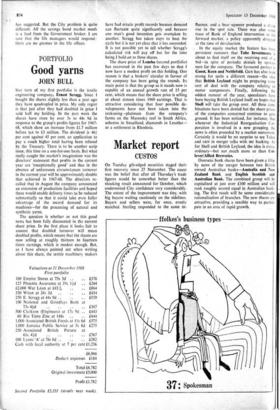Market report
CUSTOS
On Tuesday gilt-edged securities staged their first recovery since 27 November. The cause was the belief that after all Thursday's trade figures would be somewhat better than the shocking result announced for October, which undermined City confidence very considerably. The extent of the improvement was tiny, with big buyers waiting cautiously on the sidelines. Buyers and sellers were, for once, evenly matched. Sterling responded to the same in-
fluence, and a bear -squeeze produced a sharp rise in the spot rate. There was also some trace. of Bank of England intervention in the forward market, a policy apparently dropped at the time of devaluation.
In the equity market the feature has been persistent rumours that Tube Investments is about to find itself on the receiving end of a bid—in spite of periodic denials by spokes. men for the company. The favoured partner is . Guest, Keen and Nettlefold. GKN has also been strong for quite a different reason—the idea that British Leyland might be preparing some sort of deal with the company relating to motor components. • Finally, .following the oddest rumour of the year, speculators have been buying British Leyland itself on hopes that Shell will take the group over. All these com- binations have been denied but the share prices of the companies concerned continue to gain ground. It has been noticed, for instance, that whenever the Industrial Reorganisation Cor- poration is involved in a new grouping, the news is often preceded by a market movement. Certainly it would be no surprise to see Tubes and GKN in merger talks with !RC backing. As for, Shell and British Leyland, the idea is extra- ordinary—but not much more so than Uni- lever/Allied Breweries.
Overseas bank shares have been -given a fillip by news of the merger between two British owned Australian banks—Australia and New Zealand Bank and English Scottish and Australian Bank. The combined group will be capitalised at just Over £100 million and will rank roughly second equal in Australian bank- ing. The first result will be some considerable rationalisation of branches. The new-shares are attractive, providing a sensible way to partici- pate in an area of rapid growth.














































 Previous page
Previous page